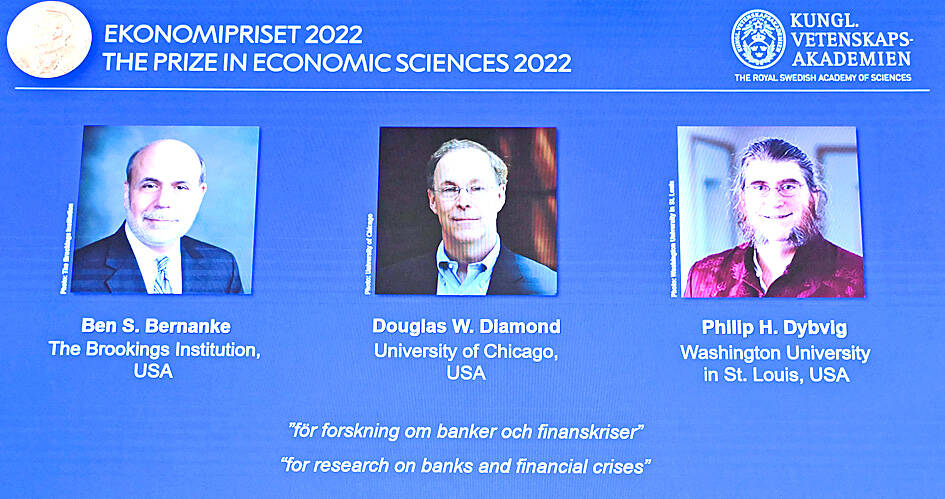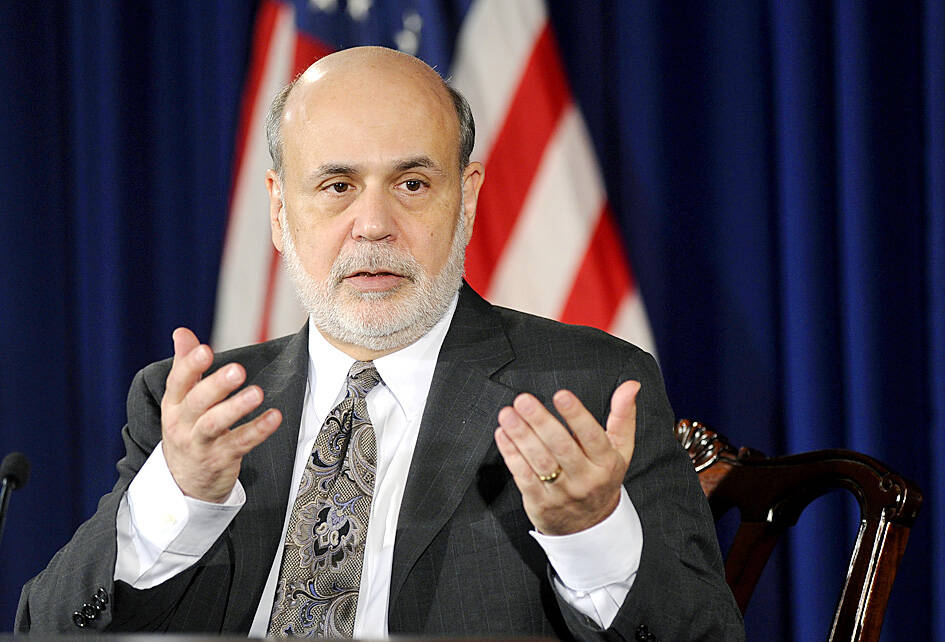This year’s Nobel Prize in Economic Sciences has been awarded to former US Federal Reserve chair Ben Bernanke and two US-based economists, Douglas Diamond and Philip Dybvig, “for research on banks and financial crises.”
The prize was announced yesterday by the Nobel panel at the Royal Swedish Academy of Sciences in Stockholm.
The committee said their work had shown in their research “why avoiding bank collapses is vital.”

Photo: AFP
With their research in the early 1980s, the laureates laid the foundations for regulating financial markets and dealing with financial crises, the panel said.
Bernanke, 68, who is now with the Brookings Institution in Washington, examined the Great Depression of the 1930s, showing how dangerous bank runs — when panicked savers withdraw their deposits — can be.
Diamond, 68, based at the University of Chicago, and Dybvig, 67, who is at Washington University in St Louis, showed how government guarantees on deposits can prevent a spiraling of financial crises.

Photo: AP
“The laureates’ insights have improved our ability to avoid both serious crises and expensive bailouts,” said Tore Ellingsen, chair of the Committee for the Prize in Economic Sciences.
Their research took on great real-world significance when investors sent the financial system into a panic during the fall of 2008.
Bernanke, then head of the Fed, teamed up with the US Department of the Treasury to prop up major banks and ease a shortage of credit, the lifeblood of the economy.
He slashed short-term interest rates to zero, directed the Fed’s purchases of Treasury and mortgage investments and set up unprecedented lending programs. Collectively, those steps calmed investors and fortified big banks.
They also pushed long-term interest rates to historic lows and led to fierce criticism of Bernanke, particularly from some 2012 Republican presidential candidates, that the Fed was hurting the value of the US dollar and running the risk of igniting inflation later.
The Fed’s actions under Bernanke extended the authority of the central bank into unprecedented territory. They were not able to prevent the longest and most painful recession since the 1930s.
However, in hindsight, the Fed’s moves were credited with rescuing the banking system and avoiding another depression.
By honoring Bernanke, the prize committee have taken an unusual step of adding an actual practitioner of economic policy to their pantheon. By contrast, many prior winners have stayed firmly rooted in academia.
That is illustrated by the widespread list of research areas celebrated in the past decade. They range from the integration of climate change and technological innovations into economics in 2018, to studies involving global poverty and auction theory in successive years.
“Prior to Bernanke’s study, the general perception was that the banking crisis was a consequence of a declining economy, rather than a cause of it,” the committee said. “Bernanke established that bank collapses were decisive for the recession developing into deep and prolonged depression. Bernanke demonstrated that the economy did not start to recover until the state finally implemented powerful measures to prevent additional bank panics.”
Nobel prizes carry a cash award of 10 million Swedish kronor (US$884,721), which is to be handed out on Dec. 10.
Unlike the other prizes, the economics award was not established in Alfred Nobel’s will of 1895, but by the Swedish central bank in his memory. The first winner was selected in 1969.
Last year, half of the award went to David Card for his research on how the minimum wage, immigration and education affect the labor market. The other half was shared by Joshua Angrist and Guido Imbens for proposing how to study issues that do not easily fit traditional scientific methods.
Additional reporting by Bloomberg

CARROT AND STICK: While unrelenting in its military threats, China attracted nearly 40,000 Taiwanese to over 400 business events last year Nearly 40,000 Taiwanese last year joined industry events in China, such as conferences and trade fairs, supported by the Chinese government, a study showed yesterday, as Beijing ramps up a charm offensive toward Taipei alongside military pressure. China has long taken a carrot-and-stick approach to Taiwan, threatening it with the prospect of military action while reaching out to those it believes are amenable to Beijing’s point of view. Taiwanese security officials are wary of what they see as Beijing’s influence campaigns to sway public opinion after Taipei and Beijing gradually resumed travel links halted by the COVID-19 pandemic, but the scale of

TRADE: A mandatory declaration of origin for manufactured goods bound for the US is to take effect on May 7 to block China from exploiting Taiwan’s trade channels All products manufactured in Taiwan and exported to the US must include a signed declaration of origin starting on May 7, the Bureau of Foreign Trade announced yesterday. US President Donald Trump on April 2 imposed a 32 percent tariff on imports from Taiwan, but one week later announced a 90-day pause on its implementation. However, a universal 10 percent tariff was immediately applied to most imports from around the world. On April 12, the Trump administration further exempted computers, smartphones and semiconductors from the new tariffs. In response, President William Lai’s (賴清德) administration has introduced a series of countermeasures to support affected

Pope Francis is be laid to rest on Saturday after lying in state for three days in St Peter’s Basilica, where the faithful are expected to flock to pay their respects to history’s first Latin American pontiff. The cardinals met yesterday in the Vatican’s synod hall to chart the next steps before a conclave begins to choose Francis’ successor, as condolences poured in from around the world. According to current norms, the conclave must begin between May 5 and 10. The cardinals set the funeral for Saturday at 10am in St Peter’s Square, to be celebrated by the dean of the College

CROSS-STRAIT: The vast majority of Taiwanese support maintaining the ‘status quo,’ while concern is rising about Beijing’s influence operations More than eight out of 10 Taiwanese reject Beijing’s “one country, two systems” framework for cross-strait relations, according to a survey released by the Mainland Affairs Council (MAC) on Thursday. The MAC’s latest quarterly survey found that 84.4 percent of respondents opposed Beijing’s “one country, two systems” formula for handling cross-strait relations — a figure consistent with past polling. Over the past three years, opposition to the framework has remained high, ranging from a low of 83.6 percent in April 2023 to a peak of 89.6 percent in April last year. In the most recent poll, 82.5 percent also rejected China’s